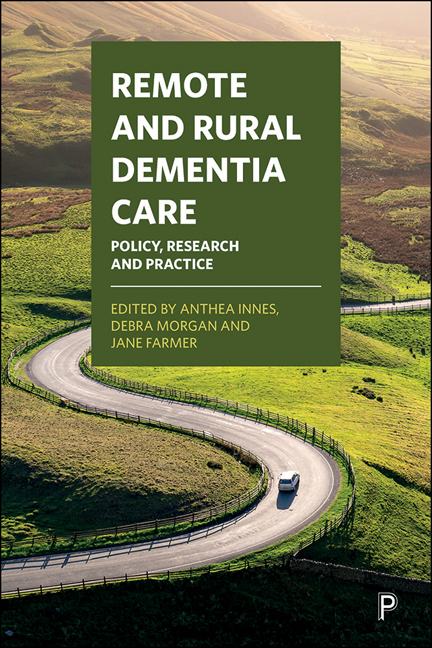14 - Conclusion: Navigating 21st-Century Remote and Rural Dementia Care and a Future Research Agenda
Published online by Cambridge University Press: 10 March 2021
Summary
Even though the intention is to offer the whole population services of comparable quality regardless of where they live, there are some challenges with living in rural areas…. (Kirkevold and Kristiansen, from Chapter 4 in this book)
Drawing across the material in this book, in this chapter we raise and discuss the emergent themes as highlighted by the contributions of leading experts and commentators from around the world. In terms of policy we consider systems issues and between-countries similarities and differences; for practice, we examine the relevance of culture and the importance of heeding the central human experience of dementia within the current healthcare system; and in respect of key emergent research topics, we feature the relevance of place-based planning and the role of technology. We end with a collated research agenda, drawing from topics suggested by authors across the chapters.
Policy and systems
Dementia is a costly issue for governments as people with dementia can live for a long time following their diagnosis, variably requiring different health and social care inputs (Prince et al, 2015). The World Health Organization (WHO) has taken a lead in establishing the need for coordinated national policy and planning approaches (2018), and has provided a toolkit for planning, education and community engagement (WHO, 2017), an online training programme for dementia carers (iSupport for Dementia) (WHO, 2020), and a knowledge exchange platform with access to key dementia data and indicators so that progress in meeting global dementia targets can be evaluated (Global Dementia Observatory) (WHO, 2019). The mhGAP toolkit can be adopted by individual countries and adapted to local systems and contexts.
The chapters in this book highlight the relevance of countries’ health systems and the contexts in which services are provided, as well as the characteristics of such services. By one interpretation, chapters depict health systems with features across a wide spectrum, from those with atomised services provided by a mixture of public, private and nongovernmental organisations (in Australia), through those that have become depleted (in Ireland), to apparently more coordinated and adaptive social welfarist models (such as those in Austria and Norway).
- Type
- Chapter
- Information
- Remote and Rural Dementia CarePolicy, Research and Practice, pp. 285 - 298Publisher: Bristol University PressPrint publication year: 2020

